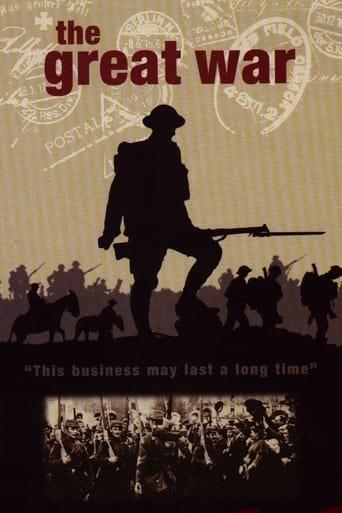dbborroughs
Absolutely one of the finest pieces of television ever produced. This is a staggering 26 part series on the First World War that lays out clearly how we got there and what happened to to the people in the middle of it. Rarely have the horrors and cost of war been so beautifully explained. This is the place to start if you want to know anything about the war. Unfortunately its so good that almost every other series on the war has paled in comparison. Its finely detailed but never overwhelming and the sort of show that makes you regret that each episode is ending. You simply want to keep watching the series because its so compelling. It a series that everyone should see because it explains not only the world of 1914 but also the world to day and is a warning to all of us about what can happen when governments fail to really think. Somewhere beyond recommended.Sadly this is not readily available in the United States and I had to secure a copy from England. I really wish some one like PBS or the Discovery Channel Networks would pick this up and run it because this has been too long hidden from view.
breezer030
Most comments on the BBC documentary series The Great War tend to praise its detailed and impressively sombre style. True, this documentary gives details on all the different years, fronts and countries that were involved in Word War I. And true, even though it takes a staggering 26 episodes of 40 minutes each (totaling over 1,000 minutes!), it stays fascinating material and wonderfully narrated.What I find problematic is that the whole focus is on facts, tending to let analysis and insights get nearly lost. It only briefly discusses the origins of the war. These go way back to the 19th century with the Crimea War, the Concert of Europe, the Franco-Prussian War, the Scramble for Africa and the competitive nature of the great powers. Although some of these elements are briefly mentioned in one of the first episodes, it only scratches the surface. I tend to find reasons WHY things happen more interesting than WHAT happens. If you would make a documentary of the Hundred Years War (14th-15th century), I guess most would focus on the causes, most important facts and the consequences of that war, and not only on every battle. I guess that the production date of this documentary (1960s) can explain the strong focus on facts; in the first decades after highly-emotional wars the focus of history writing tends to be on facts. Insight comes with time and rational distance from the war.Given the focus on the facts, I was stunned about two major omissions in the documentary. First, there was no mention of the Spanish flu. This could hardly be considered a trivial matter, since it killed more people than World War I and was raging in the trenches from March 1918 on. Maybe the impact of the Spanish flu on the war was not fully understood at the date of production of this documentary. Second, the last episodes ends at the armistice, 11 November 1918. There is no mention of the peace talks and the peace of Versailles. The Great War officially ended after the peace agreement and not at the armistice. And no mention of the aftermath and consequences of World War I.So my conclusion is that it is an impressive documentary to watch, but it could have been even better.
filmnoirfilms-1
As a great fan of THE WORLD AT WAR series, THE GREAT WAR was not a disappointment. Essential the same layout, THE GREAT WAR is the best series on WWI. Leave it to the Brits to make a fantastic documentary on this subject, vastly superior to later efforts like the the Robert Ryan / CBS series, the 1990's THE GREAT WAR series and film THE GUNS OF AUGUST.If there is a fault, it's that is it doesn't move at the quick pace of the THE WORLD AT WAR, but hey, WWII is a much more exciting war. Also, if you live in the states only PAL versions are available. I picked mine up on EBAY, the Chinese version with subtitles. Other than that it makes a must bookend for TWAW.
frankiehudson
This series is a PRICELESS exercise in archive footage - make no bones about it. The series is over 10 hours long yet consists almost entirely of archive footage from all the major battles of the war, particularly the Western Front. There is the odd interview with the veterans, well and alive and indeed quite young in 1964, yet the amazing sight is the reel after reel of archive footage. Where did they get it all from? (and why is it NEVER used in any WWI film before or since? - they all use the same few stills and films over and over again). Countless shots of the Somme battlefields, Belgium, Verdun, and everywhere! I only chanced upon it in the library, for a cheap rental; but watch this urgently. Another surprising impression is the sheer modernity of the whole thing - great guns, brilliant filming, great troop movements, even aeroplanes and dog fights. Footage shot from old Sopwith Camels of bomb-drops and stuff like that. It shows the Middle East fronts, Italy vs. Austria, Romanian fronts, Russian, the whole shebang! Also has a fantastic classical score to accompany it and brilliant narration by Sir Michael Redgrave.


